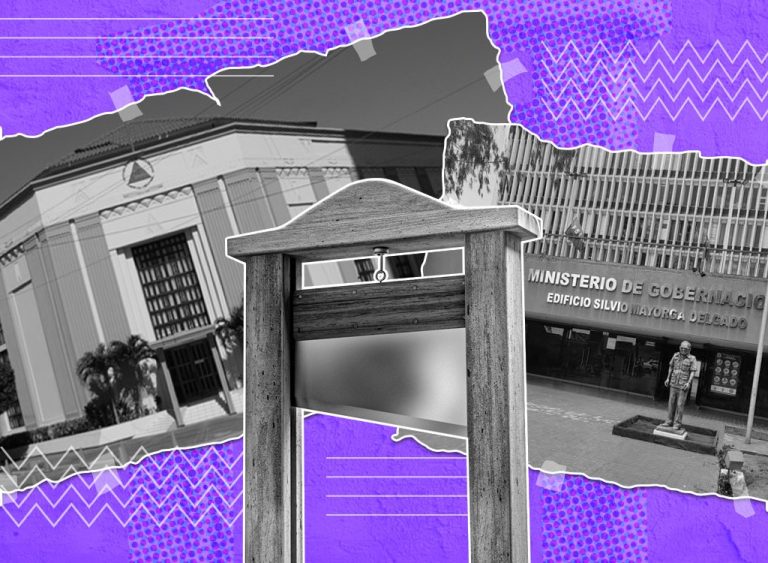9 de diciembre 2022

Children of Exile: The Births “Sowing Hope” in the Camp of Nicaraguan Farmers

PUBLICIDAD 1M
PUBLICIDAD 4D
PUBLICIDAD 5D
Nine of the canceled NGO’s may introduce a lawsuit before the international courts, accusing the Nicaraguan government of confiscating their property

Up until November, the regime headed by Daniel Ortega and Rosario Murillo has shuttered a total of 3,106 Non-Governmental Organizations, equivalent to 42.9% of the 7227 NGOs that existed in the country before the government began their push for massive cancellations. The numbers represent estimates compiled by Red Local [“Local Network”], Popol Na, Fundacion del Rio [“River Foundation”], and the Nicaragua Nunca+ [“Never Again Nicaragua”] Human Rights Collective, organizations that have made efforts to systematize the data.
The canceled organizations include 1,614 national NGOs, 328 international groups, 363 trade associations, 287 religious organizations, 148 women’s groups, 60 medical associations, 151 neighborhood associations, 82 cultural groups, 54 media outlets, 8 private universities and 6 political parties.
Katherine Ramirez of Popol Na noted that during this past year, “more repressive laws” have been approved, culminating in “the demolition of freedom of association” in Nicaragua. “In the last months, the cancellations of legal status have been effected much more rapidly – over 200 or 300 organizations closed in a week’s time,” she detailed.
Data about the non-profit organizations canceled in Nicaragua has now been posted on the mini-site libertadasociacion.org. Construction of the site and compilation of the data have been part of an effort on the part of the aforementioned organizations to preserve “the historic memory” of what has occurred in the country. They also hope to continue following up on similar events that may present themselves in the future.
Red Local, Popl Na, Fundacion del Rio and the Nicaragua Nunca+ Human Rights Collective have also assembled nine complete files that could be used in the future for filing a court case at an international level against the Ortega-Murillo regime. In the case of these nine organizations, not only did the regime cancel their legal right to operate as an organization, but they also confiscated their assets and property.
The cancellation of these nine NGOs “added almost four million dollars to the state coffers, given the value of the properties confiscated.” Furthermore, approximately 50,000 people “were left without access to the needed services offered by these organizations, which covered over 50 municipalities (30%) all over Nicaragua, and especially in the North and the Caribbean regions,” explained the organizations that worked assembling the files.
Carlos Guadamuz, with the Nicaragua Nunca+ Human Rights Collective added that of these nine organizations, eight are national and one international. The cancellation of their legal status left 152 people unemployed.
The human rights advocate also emphasized that seven of the nine organizations suffered illegal searches and only in one case were these carried out in a non-violent manner. He noted that they’ve documented threats against the members and executive boards of the organizations whose cases they analyzed.
Amaru Ruiz from the Fundacion del Rio stated that the creation of these nine files will support the “construction of historic memory.” He added that no date has been set for the preparation of an eventual court case against the Nicaraguan State.
The mini-site libertadasociacion.org has also posted three complementary reports, all in Spanish: [translated titles] “Universal Periodic Review (UPR), Intermediate report – Nicaraguan Platform of NGO Networks”; “The Brutal Demolition of Free Association in Nicaragua”; and “Intermediate Report, UPR. All three speak of “the severity of the abolition of freedom of association in Nicaragua.”
Among other things, these reports note that the path of criminalizing association utilized by the Ortega-Murillo regime began with smear campaigns, threats, surveillance, and periodic detentions of those who made up the non-profit organizations. These attacks escalated until they culminated in the de facto confiscation of the organizations.
Different types of aggression against NGOs documented from 2007-2022 included:
This article was originally published in Spanish in Confidencial and translated by Havana Times
PUBLICIDAD 3M
Confidencial es un diario digital nicaragüense, de formato multimedia, fundado por Carlos F. Chamorro en junio de 1996. Inició como un semanario impreso y hoy es un medio de referencia regional con información, análisis, entrevistas, perfiles, reportajes e investigaciones sobre Nicaragua, informando desde el exilio por la persecución política de la dictadura de Daniel Ortega y Rosario Murillo.
PUBLICIDAD 3D